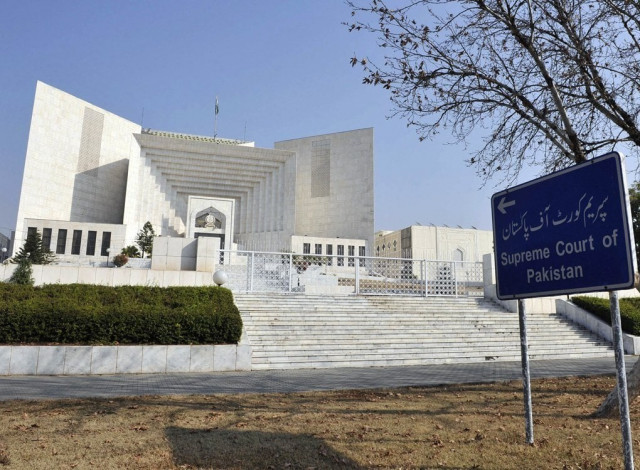Top court to announce judgment in Isa case on Feb 22
Verdict to reveal whether three minority judges will be included in the bench

In the backdrop of a tense situation among the judges, the top court will announce its reserved judgment on February 22 on Justice Qazi Faez Isa and superior bars’ plea regarding inclusion of three minority judges in the bench hearing the review petitions against the June 19, 2020 order.
A six-judge larger bench, headed by Justice Umar Ata Bandial, on December 10, 2020 reserved the decision on the plea filed by Justice Isa, his wife and other petitioner bars regarding inclusion of three judges – Justice Maqbool Baqar, Justice Syed Mansoor Ali Shah and Justice Yahya Afridi – in the bench hearing review petitions against a judgment wherein the Federal Board of Revenue (FBR) was directed to conduct inquiry into the matter regarding non-disclosure of SC judge’s family members’ assets abroad.
Senior lawyers said that there is a chance that the court may rule that a similar number of judges bench (seven members) should hear the review petition against the June 19, 2020 order. After the retirement of Justice Faisal Arab, Justice Aminuddin, a senior judge, is eligible to hear Justice Isa’s review petition.
During the hearing of the case in December last month, Justice Isa’s wife, Sarina, said that Chief Justice of Pakistan (CJP) Gulzar Ahmed should be impartial and that he is a respondent in this case as a member of the Supreme Judicial Council (SJC) which had issued a show-cause notice to Justice Isa.
Upon this, Justice Bandial had rebuked Sarina Isa for calling into question the impartiality of CJP Gulzar.
A visibly perturbed Justice Bandial told Sarina Isa not to overstep her limits. "You should be careful while talking about the chief justice and the institution," he had noted.
Later, the apex court on February 11 ruled that Justice Isa should not hear cases related to Prime Minister Imran Khan.
“The Hon Chief Justice of Pakistan, therefore, observed that in these circumstances, it would not be proper for the Hon Judge to hear the matter considering that he had already filed a petition against the Prime Minister of Pakistan, in his personal capacity. Therefore, to uphold the principle of un-biasness and impartiality, it would be in the interest of justice that the Hon Judge should not hear matters involving the Prime Minister of Pakistan,” said a five-page written order of Chief Justice Gulzar. Justice Bandial was also a member of that bench.
Two days later, Justice Isa expressed “shock” over the release of that order – barring him from hearing cases against PM Imran Khan – to the media before being shared with him and sought explanation from the Supreme Court’s registrar.
Following this emerging situation, the announcement of reserved judgment will be significant.
Earlier, the Supreme Court Bar Association (SCBA) contended that if a bench – not including dissenting judges – heard the review petitions in Justice Isa’s case, then such adjudication would give rise to a perception that the dissident judicial voices are being silenced.
"This naturally raises questions of transparency and impartiality, whether well-founded or ill-founded. Transparency and impartiality occupy a central place in the adjudicative arena,” SCBA President Lateef Afridi said in his written arguments submitted to the Supreme Court in this case.
A number of petitioners challenged a split order delivered by a 10-judge Supreme Court bench on June 19 on petitions filed against a presidential reference that sought Justice Isa’s removal due to his failure to mention his family members’ foreign properties in his wealth statement.
Seven of the judges had referred the matter to the FBR for an inquiry. The FBR was directed to submit its findings to the SJC, which could revive the reference. The SJC is the forum that can hold superior court judges accountable.
In order to hear review petitions against the judgment, the chief justice formed a seven-judge bench comprising all the judges who wrote the majority judgment. One of the members, Justice Faisal Arab, retired on November 3 and later another bench was announced comprising the remaining six judges.
Three judges – Justice Maqbool Baqar, Justice Syed Mansoor Ali Shah and Justice Yahya Afridi – who held the minority view, were excluded from the larger bench.
Talking with reference to the CJ’s decision, the SCBA president stated that as the law stands, the court or the CJ has no discretion as far as the number of judges of the review bench is concerned because judgment/order of the majority is the judgment/order of the court.
“The chief justice of Pakistan does not have much discretion when the same judges are physically available and practice of the court is no different.
“However, if after reasonable efforts the presence of a judge/judges of the original bench cannot be ensured, then exceptionally other judges could be made part of the review bench.”
He said the circumstances of every case might differ. However, in the present case, all judges are available except one, Justice Faisal Arab, who recently retired.
“Finally, in the case under examination, if the court does come to the conclusion that under the circumstances, it has discretion, then that discretion in a case like this ought to be used where it ‘does most credit to the nation’," the SCBA concluded.
Afridi said the court must keep in mind the very real public perception of dissident judicial voices being silenced as well as the fact eyes of the entire nation are on this court.
"This court must decide with respect to the exercise of its judicial discretion – if the fate of the constitution of the bench hinges on it – an answer to the question: “Which conception does most credit to the nation.”
He said not making at least three dissenting judges part of the review bench is actually denying Justice Isa the right of actually having a chance of the decision being recalled or overturned in the review.
"For instance, if the original bench is constituted in the present case and at least three judges in the majority opinion decides to change their view in favour of the petitioner, then the original judgment can be recalled. However, with the current constitution of the bench, it has no chance of happening.”



















COMMENTS
Comments are moderated and generally will be posted if they are on-topic and not abusive.
For more information, please see our Comments FAQ